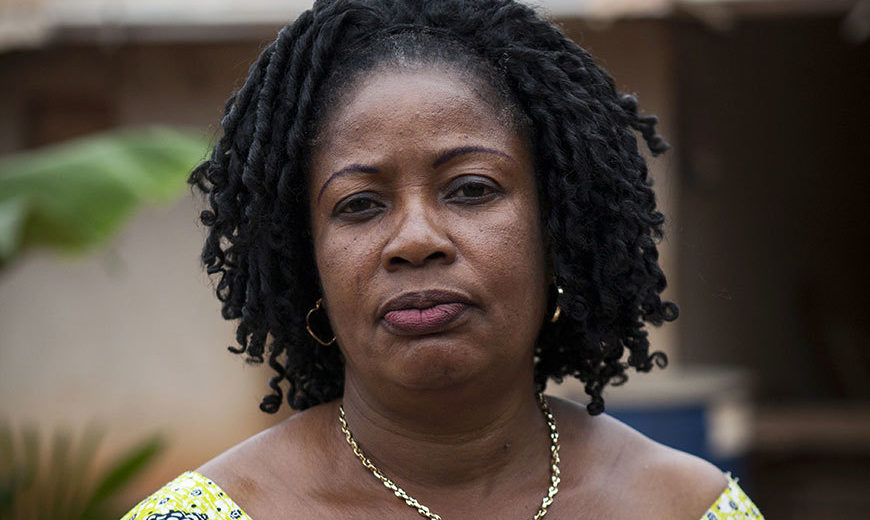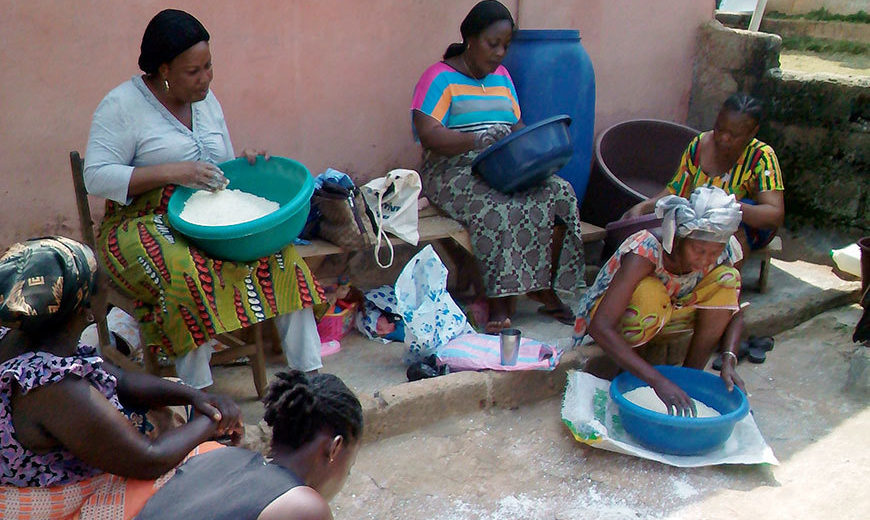18 Oct 2019
The power of women: An interview with Julienne Assoko, graduate of the Women’s School of Leadership
Since it was first launched in May 2017, the Women’s School of Leadership, a Fairtrade Africa project funded by UK retailer Co-op and Compass UK and Ireland, has been a catalyst for change for many Fairtrade cocoa cooperatives in Côte d’Ivoire.
Many of its first students – from an initial group of 22 participants who graduated in June 2018 – have assumed leadership roles in the management of their cooperatives, communities and households. Nineteen of the women from the first cohort of graduates are now leading the Women’s Associations in their cooperatives, which are engaged in setting up income-generating projects such as cassava, nuts and maize production.
One of these women is Julienne Assoko, a producer at CAPRESSA, one of the Fairtrade certified cocoa cooperatives in Côte d’Ivoire that supplies to Ben & Jerry's. Now that the second cohort of students – totaling 30 women and 10 men from Fairtrade certified producer organizations in Côte d’Ivoire – has been recruited, we talked to Julienne to find out more about her experience, her ambitions and her message for those who will soon enter the classroom.

Image courtesy of Fairtrade Foundation
Fairtrade: You graduated from the Women’s School of Leadership. How did this experience impact you?
Julienne: During the year that I attended the programme, I learned a lot. It was a very beautiful and productive experience for me. Although I was already a member of the management board of my cooperative, the programme reinforced my capacities in the exercise of my functions and enabled me to diversify my activities. In a way, the School of Leadership helped me unlock my school education. All my hidden talents were revealed. I used to think that I wasn’t useful to the community and that I should just work the land. I didn’t think that, as a producer, I could do much more beyond my own plantation. But, through my participation in the school, everything changed. My vision changed. I realized how much I could do for my cooperative, my community and my personal projects.
You are also the President of the Women’s Association in your cooperative. How was the Association created?
Julienne: As a member of the management board of CAPRESSA, I was travelling around sensitizing members of the co-op. During these tours, I realized that women were not organized in associations. I informed the President of our Board about this situation and, with the agreement and willingness of the women, we founded the Association in February 2018. There was an election and I was elected President by a majority. The Association is made up of 14 groups and each of these groups has its own project.
What have been the main achievements of the Association so far?
Julienne: Our main project is the production of attiéké or granulated fermented cassava pulp from our cassava yield. Attiéké is used as a side dish and is an integral part of the cuisine of Côte d'Ivoire so its production provides a great opportunity to generate extra revenue for the women. We are providing support to one of our groups in Dallo, where members are composting cassava pellets to generate extra income. And, finally, CAPRESSA is supporting another project, led by the FRAMSTRONG company, to build a greenhouse for soil-less culture.

Image courtesy of Julienne Assoko
What are your next objectives for the Women’s Association?
My main objective is that each of the groups has a project of their own to run and that that all the women involved become independent. I would also like them to be able to actively participate in the meetings and activities of the community and the cooperative.
The recruitment of the second cohort of students of the Women’s School of Leadership has just concluded and the programme will start in Autumn 2019. What is your message for this new group of students?
I have great hopes for this second group of students because the first cohort represents a concrete example for them of what can be achieved.
Whatever the difficulties, I believe they will do great. I consider our work to be a kind of ‘tourist site’ for the new group. Our experiences will motivate them. In our case, we believed in the direction the school was taking even though there was no example to follow. There was a lot of positivity in the training sessions so we were totally motivated. I am sure this will be the same for the new ones.
You have also been elected to represent producers at the Fairtrade Africa Producer Congress for West and Central Africa. What motivated you to take on this role?
I want to seize this opportunity from Fairtrade to show the capacity of the women. I was motivated to apply by my desire to bring the voices of the women to the highest level, demonstrate their value and reiterate that women have the same rights and capacities as men. Overall, my main functions will be to defend the interests of the producers, particularly those of the region. I want to be the voice of the producers, bring forward their propositions, suggestions and expectations.
You are part of a Fairtrade certified cooperative and you are now an active member of the Fairtrade Producer Congress. What does Fairtrade mean for you as a person?
For me, Fairtrade is a label which fights for the well-being of the producers, a movement that gives producers the opportunity to decide their own futures. It is also a system where the producers are, at the same time, beneficiaries and owners.